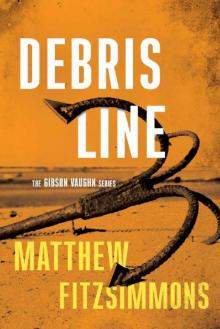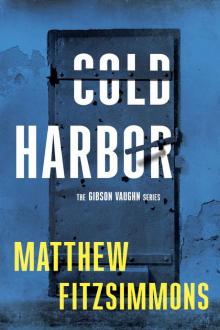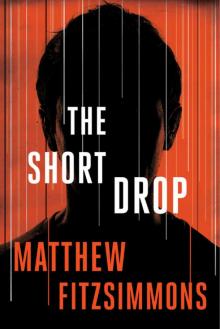- Home
- Matthew Fitzsimmons
Cold Harbor (The Gibson Vaughn Series Book 3) Page 5
Cold Harbor (The Gibson Vaughn Series Book 3) Read online
Page 5
“Why don’t you ask me?” Gibson asked.
“You’ll tell me when you’re ready.”
“Don’t know I ever will be.”
Toby nodded over his coffee. “A risk I am willing to take.”
“I’ll leave in the morning.”
“And do what?”
Gibson got into bed, still brooding about Toby’s question. He already knew Duke’s answer and that Bear had another. He’d made promises to each of them and could feel their impatience, waiting to see whom he would disappoint. He feared the answer would be both. An unfamiliar instinct to lie down and die had coiled around his heart. He’d experienced his share of hardship: the death of his father, his arrest and trial, the end of his marriage. He’d always picked himself up and soldiered on, always found a fight to rally him: his father’s memory, his freedom, his daughter.
This felt different.
The people he wanted to fight for didn’t want him. He could track down his ex-wife and daughter, but if Nicole feared him enough to disappear with Ellie, then what good would it do? If he had lost Ellie, then he feared that his incarceration had stripped him of more than just his sanity.
“That’s why Washburn has to pay,” Duke growled.
“That’s why you have to find Ellie,” Bear whispered.
Accustomed as he was to a bare mattress, the sheets hung around him like a straitjacket. He kicked them off, twisting this way and that, unable to get comfortable. He switched off the bedside lamp. The sudden darkness, viscous and bitter, rose up, enveloping him like a black ocean. It filled his lungs, choking him. Gibson flailed wildly. Knocked the lamp off the table. He sprawled out of bed after it, clawing at the floor until his hand closed on the lamp. He turned it on and clutched it to him, shaking and hyperventilating. In time, he got up and switched on every light in the room, each one restoring a part of his calm. He went and splashed water on his face. When he came back to the bedroom, his father was sitting on the bed. Duke did not look pleased.
“Look what they’ve done to you.”
Gibson looked away.
“You really can’t think of anything worth fighting for?” Duke asked. “You’re really going to lie down for them? That’s what he wants, you know.”
“Who?”
“The man who put you in that cell. Does he get a pass? What about our plans? Or was that just all talk?”
“I have to find Ellie. Anyway, he’s CIA.”
“And you’re a decorated Marine who helped get bin Laden. Will you just be a footnote in his career? A name he can’t quite remember after you crawl off to die. That sit well with you?”
“No,” Gibson admitted.
“Then make him remember you.”
When Duke had gone, Gibson lay on the floor beside the bed. It felt more comfortable to him than a mattress. Bear came and flopped down on the bed. She peered over the side at him.
“Ellie needs you.”
“You don’t know that,” Gibson said.
“I do. She does. You can’t let anything stop you. You have to find her. You found me. Remember?”
“Bear, I found you too late.”
Bear smiled down at him. “Then hurry.”
CHAPTER SEVEN
Gibson woke to an empty house. Not even seven a.m., but Toby and Sana had long since left for the diner. Gibson had once asked Sana how she could work those hours. She told him it wasn’t work if you loved it. He’d known exactly what she’d meant.
His body made a tired plea for more sleep, but Gibson ignored it and popped right up from the floor. He could rest after he found Ellie.
He took another shower for the simple pleasure of hot water. He dressed in the same clothes as the night before. Laundry wasn’t at the top of his list this morning. Clean clothes right out of the dryer would be luxurious, but he needed to earn it.
He felt surprisingly normal; maybe a shower and a good meal with a friend had been all it took to reset. He hadn’t seen Duke or Bear yet this morning, and he took that as an encouraging sign that he was putting his ordeal behind him. Full of optimism, he went downstairs, where he found Duke reading the newspaper. So maybe he wasn’t ready for a clean bill of health quite yet. Over the newspaper, his father watched Gibson plug in his laptop.
“I’m not going after Washburn,” Gibson said.
“So I’ve heard.”
“Do you understand why?”
“Hey, it’s your life, kid.”
Gibson hadn’t expected his father to give up so easily.
“It’s a little humbling actually,” Duke said.
Here it came. “What is?”
“I was chief of staff for a US senator. I could talk a socialist into lowering taxes on the wealthy and an evangelical into voting against school prayer. Now I can’t even out-argue a child. I must be slipping in my old age.”
“You wouldn’t do the same if it was me?” Gibson asked.
“Like I said, it’s your life. I’m just a dead man who the world still thinks was a suicidal loser. What do I know?”
Gibson decided not to bite. He’d been subjected to this guilt trip for the last eighteen months. Instead, he pointed to the newspaper spread out on the table. “Mind if I . . .”
“Oh, by all means, don’t let me get in your way.” Duke took his newspaper into another room.
To Gibson’s relief, his laptop booted right up despite eighteen months on a shelf. He hacked a neighbor’s Wi-Fi and logged into his e-mail, looking for anything from Nicole. He found plenty, but it all predated the fire. Before the fire, a steady stream of correspondence flowed between them. Then nothing. Total radio silence. It was too depressing to contemplate, so out of morbid curiosity, he Googled himself.
In his absence, theories about Gibson’s involvement with the death of Vice President Benjamin Lombard had proliferated. AmericanJudas.com—a popular conspiracy website that had been the first to post evidence placing Gibson in Atlanta—continued to lead the charge. It painted Gibson, a disaffected former Marine, as a high-tech Lee Harvey Oswald who’d had an irrational obsession with Benjamin Lombard for more than a decade. But to hear American Judas tell it, Gibson was only a hapless pawn—the triggerman—in a tangled conspiracy to alter a presidential election.
It was so wildly off the mark that Gibson could only shake his head. The truth was both much simpler and far worse. There was no mention of Niobe, West Virginia, or Charles Merrick, but the arson and subsequent disappearance of Nicole and Ellie Vaughn had been exhaustively detailed. Further proof that something nefarious had happened in Atlanta.
A raft of sightings in the last year placed Gibson everywhere from Las Vegas playing high-stakes Pai Gow to eating Oreos on a ferry from Victoria, British Columbia. Great, he thought, they’d turned him into Bigfoot. God, he hoped Ellie didn’t see this garbage until she was old enough to understand it. Gibson closed the browser tab; it was time to get to work.
Computers had been a sanctuary for Gibson ever since he’d been a boy. They’d always made sense to him on an intuitive level, and hacking had originally been an abstract intellectual exercise—breaking into networks merely a puzzle to solve. Disappearing into work that he could control while his life descended into chaos had kept him sane. He imagined it was like that for anyone who was good at something.
It had a similar effect on him now, and, as he ran diagnostics and updated the machine’s drivers and operating system, something of the old Gibson Vaughn returned. His vision began to clear around the edges, and the asbestos haze clouding his thoughts slowly dissipated. He drove himself faster and faster, enjoying feeling sharp and reveling in the simple pleasure of work. Duke and Bear must have also recognized it because they made themselves scarce.
Thirty years ago, people could disappear into America and reinvent themselves. Now it took meticulous planning and a commitment never to reach out to your old life. For most, the lure of the Internet proved too great to resist—the urge to Google yourself, or search Facebook for the people
you’d left behind. The simple truth was there was no such thing as starting a new life. The best you could manage was a convincing rebranding. A fresh coat of paint, but that was all. You might change your name. You might even change your face. But you couldn’t change the person underneath, and the person underneath would still have the same needs and wants, the same habits and tastes, the same strengths and weaknesses.
Once Gibson admitted that he could find no trace of Nicole or Ellie Vaughn, he fell back to what he knew about his ex-wife. Nicole Vaughn was an avid reader, and still would be no matter what name she had adopted. Over the past decade, Nicole had reviewed well over a thousand novels on Goodreads, a website for book lovers. She served as a reader for a host of novelists and received advance copies of new books. Her network of followers read her reviews and trusted her recommendations. Although he couldn’t find her original Goodreads profile, Gibson would bet good money that she’d only changed her user information rather than delete it entirely. The Nicole he knew would have had a very hard time leaving that investment behind.
Playing a hunch, he searched prolific book reviewers on the site looking for anything that sounded familiar. A profile belonging to a “Gwen Hodges” stuck out to him—similar genres and now with nearly two thousand reviews. She had been productive in his absence. But the reviews themselves were the kicker. Nicole had a distinctive writing style, and when they were married, she would read her reviews aloud to him before publishing them. He could hear her voice in Gwen Hodges’s writing now. He kept reading until he felt certain.
Next, Gibson searched the website of Manhattan public relations firms, which conveniently posted photographs of their agents. He settled on a young associate named Anne DeWitt. Anne had a kind, open face. His next step was to spoof an e-mail address that appeared to originate from her firm. Then “Anne” wrote an e-mail detailing her attempts to reach Nicole. Anne had a terrific thriller by a promising debut author and wanted to send Nicole an advance reader copy to review. Gibson wrote three drafts, tweaking the tone and wording, before e-mailing it to Nicole’s mother.
Phishing a sixty-year-old made Gibson feel more than a little dirty. Nicole’s parents were not very tech savvy and had joined the twenty-first century only under duress. He could think of dozens of ways to hack them, but a phishing attack felt the least invasive. He didn’t want to intrude upon her mother’s life more than necessary. They’d never warmed to Gibson, and somehow this tactic proved all the things that they’d always thought about him. Duke strolled past the kitchen and complimented his son for his chivalry.
“You’re so noble. It’s a goddamn inspiration in these dark times.”
Gibson had nothing to say to that. He felt guilty hacking Nicole, and he struggled to differentiate himself from a stalker. From any of the estranged ex-husbands on the news who forced their way back into lives better off without them. Bear had argued that this was different. That Nicole had run because of a misunderstanding—she thought Gibson had burned down the house. Once she knew that it was all a mistake, things would go back to normal. Bear sounded so compelling, and God knew, Gibson wanted to be convinced. He missed Ellie terribly.
His laptop announced an incoming e-mail. Nicole’s mother had taken the bait. To her credit, Elizabeth Anne didn’t cough up her daughter’s address to a stranger on the Internet. At least not without exchanging a few e-mails first.
They traded messages all afternoon. Nicole’s mother peppered “Anne” with questions. Gibson kept it light and upbeat, stalling at least thirty minutes between messages. Couldn’t come across as too eager, and when he felt it starting to drag out, he sent a brief reply and then ignored her next message entirely. Anne DeWitt was a busy woman and had better things to do than beg an amateur reviewer to read a book. Two hours passed. Gibson held his breath until an apologetic note arrived along with a PO box outside Seattle.
Bear did a happy dance around the kitchen.
The PO box was a smart move—one more firewall between Nicole and the outside world. But not from Gibson. A five-minute phone call to the store manager in Seattle netted the PO box owner’s name—Gwen Hodges. Humans were always the weakest link in any security. He hung up the phone and got back to work. An hour later when Toby got home, Gibson was staring at Gwen Hodge’s house on Google Street View, contemplating his next step.
Finding Nicole, he was beginning to realize, had been the easy part. Approaching her would be a whole other mess, and he didn’t really know where to begin. He wouldn’t be able to pretext his way past her as he had the store manager. It would require the truth, and the truth depended on how you arranged the facts.
“You’re still here,” Toby said, managing to sound both sardonic and delighted in the same breath.
“I’ll leave in the morning.”
“Enough with that. Please.”
Toby chatted at Gibson for a few minutes, still doing an admirable job pretending that the long-haired ghoul in his kitchen was, in any way, normal. One of Toby’s kitchen staff had a pregnant wife. A false alarm had forced Toby to sub for him midshift. It had not left him in the best mood. Toby excused himself to take care of his chores. He returned a few minutes later.
“I have laundry to do,” Toby said and held up Gibson’s duffel bag. “Mind if I disinfect whatever is in this?”
“Only if the incinerator is full.”
“Agreed,” Toby said and left him alone in the kitchen to contemplate Nicole.
This morning, Gibson had experienced a moment of self-righteous anger. He’d imagined meeting Nicole face-to-face. She’d stolen his daughter from him, and he hadn’t done anything wrong. But a day of cyberstalking his ex-wife had cost him the high road, and now he wasn’t sure what to do. Armed with her address, he could book a ticket to Seattle and confront her at home. But try as he might, he couldn’t find a way to say it that didn’t sound like an ambush. What was he hoping to achieve? Other than scare a woman afraid enough to take out a restraining order and confirm all her suspicions about him.
E-mail, he decided, was a safer option. He could take his time and formulate his thoughts. It gave him the best chance to convince her that he hadn’t burned down her home. It was certainly better than showing up unannounced on her doorstep. The only problem was, he needed an e-mail address for her. Try as he might, he couldn’t find one. She’d no doubt known that would be how he’d look for her.
That’s when Gibson remembered the old emergency e-mail account that they’d set up when he’d been on active duty. An anonymous account that had no connection to either of them, and from which neither had ever sent an e-mail. In the event of an emergency, either one of them could send an e-mail back to the account itself, creating a closed-message loop. If she hadn’t deactivated it as well, he could try reaching out to her that way. He logged into the account to begin drafting his message to her. In the inbox was a single, unread e-mail dated six weeks after the fire; the subject line read: “Gibson.” He took his hands off the keyboard, as if afraid they’d accidentally open the Pandora’s box. At the kitchen sink, he threw water on his face—it had worked the night before but now succeeded only in making him wet—then went back to the kitchen table and read Nicole’s message:
Ellie is safe. I hope that you are too. Although the fact that you still haven’t made contact makes me imagine the worst. I pray it’s not true, but I can’t imagine what could have kept you away.
The police have confirmed the fire was arson. I didn’t want to believe it, but there’s no question. They’ve labeled you a person of interest in the investigation. It’s important to me that you know that I don’t believe you had anything to do with it. I’ve told the police over and over that they have the wrong idea about you and that their portrait of you doesn’t resemble the real you, but they won’t listen to me.
I won’t believe you started the fire, but I do think the fire is because of you. I think whatever you got yourself mixed up in the last two years tracked you back to your daughter and burn
ed her home to the ground. So while I don’t blame you for what happened, I’ll never forgive you either. No one put a gun to your head. You chose this path for your own selfish reasons, and you’re too smart a man not to have known there would be repercussions.
Gibson, I don’t think you’re a bad man, but you’re bad for your daughter. I don’t know if you’re alive or dead, but I am taking her where the people who want to hurt you can’t hurt her. If anything of the man I married remains intact, you’ll understand that and help me protect her by staying away. I imagine you’ll find us if you try; I’m begging you not to try. For Ellie’s sake, you have to let her go. Give Ellie a chance at a safe, normal childhood. Trust me to take care of her, and stay away. Please.
Gibson stood up and backed away from the computer. Unable to be still, he paced through the house, desperate for a counterargument that would neutralize hers. At a loss for what to feel, think, or do. Afraid, on a bedrock level, that Nicole’s e-mail was the most honest and true thing he’d ever read. He could find no fault in Nicole’s belief that the fire connected back to him.
Bear looked up mournfully at him. “You have to respond.”
“And say what? She’s right.”
“She can’t do this,” she said. “Ellie needs you.”
Gibson wasn’t so sure Bear didn’t have it backward. His reasons for going to Seattle were all selfish ones. Ellie would make him feel sane again. Ellie would love him. Ellie would save him. It wasn’t the responsibility of a nine-year-old to take care of her father. And what did he really offer his daughter in return?
He stopped at a framed photograph of Toby and Sana with their daughter. Gibson took it off the wall, either for a closer look or to smash it to pieces. If he had matches, he would burn their picture-perfect home to the ground. Then he heard Toby moving around upstairs, and his breath hitched. With both hands, he rehung the photo, chastened for even thinking that about his friend.
But an old, familiar anger had flared back to life. A coal cradled in the ash of a dead fire. The same anger that he’d turned on Senator Benjamin Lombard after his father’s death and that had fueled his pursuit of Charles Merrick’s stolen fortune. The anger that had sustained him during his eighteen months in solitary confinement. Toby and Sana didn’t deserve to be on the receiving end, but Gibson knew who did. The CIA agent who had ordered him taken into custody at Dule Tree Airfield.

 Cold Harbor
Cold Harbor Poisonfeather (The Gibson Vaughn Series Book 2)
Poisonfeather (The Gibson Vaughn Series Book 2) Debris Line (Gibson Vaughn)
Debris Line (Gibson Vaughn) Cold Harbor (The Gibson Vaughn Series Book 3)
Cold Harbor (The Gibson Vaughn Series Book 3) The Short Drop
The Short Drop